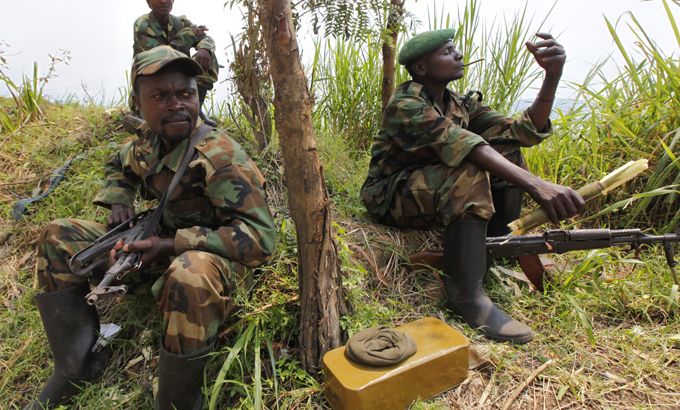DR Congo fighters given deadline to exit Goma
A regional summit in Uganda has given the armed group until Monday to withdraw from Goma and other eastern areas.

Bishop Jean-Marie Runiga Lugerero, political leader of the M23 armed group in the Democratic Republic of Congo, has said that a pullout from the eastern city of Goma could not be a precondition for talks with the government.
Runiga Lugerero’s comments come after a decision by a regional summit on Sunday, that said the group had until Monday to withdraw from territories in the eastern DRC.
Speaking to the AFP news agency on Sunday, Lugerero said: “withdrawal from Goma should not be a prerequisite for talks but rather should come as the result of talks”.
 |
| Click here to read Nazanine Moshiri’s “ask me anything” |
Delegates at the regional summit in the Ugandan capital, Kampala, said it was “imperative” that the fighters exit the eastern city of Goma, which they seized on Tuesday, before any talks could be held with the group.
Withdrawal from the regional capital “is an important and unavoidable imperative” for negotiations to begin, Lambert Mende, DRC government spokesman told the AFP news agency.
Joseph Kabila, president of the DRC, has held direct talks with the leader of the armed group in Uganda, but Al Jazeera’s Peter Greste, reporting from Kampala, has said the Saturday meeting in the Congolese capital was not a round of negotiations, but a “discussion”.
Runiga Lugerero confirmed the two-and-a-half hour conversation on Sunday.
While he was not invited to the summit itself, Runiga Lugerero told the AFP news agency he had been able to meet Kabila thanks to the mediation of Yoweri Museveni, the Ugandan president, with whom he had been due to hold talks.
“The atmosphere was tense but afterwards, each [side] calmed the debate down because these are not personal problems, but problems of the country” that must be settled, he told AFP news agency by phone.
“I think the meeting went very well.”
‘Sweeping reforms’
Leaders at the summit in the Ugandan capital on Saturday said that the rebels should withdraw to positions at least 20 km north of Goma, the eastern DRC town in the province of North Kivu that they seized on Tuesday.
UN chief Ban Ki-moon also called on the rebels “to immediately lay down their arms in accordance with the agreements reached in Kampala, and comply with the immediate withdrawal of their forces from Goma.”
Runiga Lugerero, however, made it clear that any withdrawal would only come about after talks between the rebel movement and Kabila. M23 fighters will defend their positions if Congo’s troops attacked, he warned.
Runiga Lugerero’s announcement came just days after Kabila had appeared to rule out talks with the rebel force.
Paul Kagame, the Rwandan president accused of backing the rebels, did not attend the Kampala summit and instead delegated his foreign minister Louise Mushikiwabo.
Rwanda and Uganda, also accused by the UN of supporting the rebels, deny the charges.
|
Nazanine Moshiri meets M23 rebels at Lake Sake |
Al Jazeera’s Peter Greste, reporting from Kampala, said M23 political leaders will have another round of talks with Kabila again in the Ugandan capital on Sunday.
Raymond Tshibanda, Congolese foreign minister, confirmed that the first meeting took place but said further face-to-face talks between Kabila and M23 were unlikely.
“It’s very hard for the Congolese government to acknowledge that they are speaking to the rebels as they consider them an illegitimate group,” Greste said.
“The M23 want to discuss sweeping reforms and broad issues concerning the country, like healthcare, education and human rights. They say these topics are on the table. But the government would find it very difficult to discuss such issues with them.”
Former fighters
The M23 was launched by former fighters from the Tutsi ethnic group, the minority group that inhabits both Rwanda and DR Congo and to which Kagame belongs.
The rebels were integrated into the military under a March 23 2009 peace deal from which their name is derived. The mutineers say the terms of that deal were never fully implemented.
After the summit in Kampala ended, president Kabila was asked if he was happy with the outcome. He said he would be satisfied “when peace returns”.
The summit was officially reserved for the nations of the 11-member International Conference on the Great Lakes Region.
Dlamini Zuma, head of the AU commission, reiterated the bloc’s “deep concern at the worsening humanitarian situation on the ground and the abuses committed against the civilian populations”.
The rebels captured Goma on Tuesday, and took the key town of Sake 20 kilometres to the west the next day.
The fighting has created a humanitarian crisis, forcing tens of thousands of people to flee, amid persistent reports that the M23 rebels have carried out atrocities against local people.